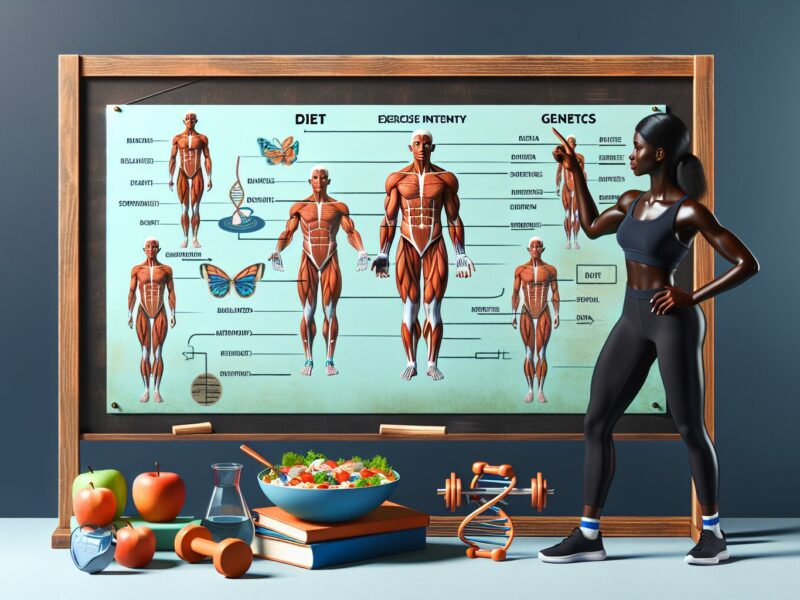Are you looking to pump up your muscles and achieve that chiseled physique in just two short weeks? If you’ve ever wondered how to get big muscles in such a limited time frame, you’re in the right place. In this article, we will explore some effective strategies and techniques that can help you maximize your muscle growth and achieve noticeable results in just two weeks. So, if you’re ready to embark on this muscle-building journey, let’s dive right in and discover the secrets to getting those big muscles you’ve always dreamed of.
Designing a Balanced Workout Routine
Evaluating Your Current Fitness Level
Before embarking on a new workout routine, it’s important to evaluate your current fitness level. Assess your strength, endurance, and flexibility to determine where you currently stand. This will help you set realistic goals and tailor your workout routine to your specific needs.
Setting Clear Goals
Once you have evaluated your fitness level, it’s time to set clear goals for yourself. Ask yourself what you hope to achieve through your workout routine. Do you want to build muscle, increase stamina, lose weight, or improve overall fitness? Setting clear goals will help you stay focused and motivated as you progress.
Choosing Suitable Exercise
To design a balanced workout routine, it’s crucial to choose exercises that align with your goals and fitness level. Include a combination of cardiovascular exercises, strength training, and flexibility exercises to ensure you are working all areas of your body. Consider exercises such as running, weightlifting, yoga, or swimming.
Determining the Frequency and Duration of Workouts
The frequency and duration of your workouts will depend on your goals, fitness level, and schedule. Aim for at least three to five days of exercise each week, allowing for rest days in between. The duration of each workout should range from 30 minutes to an hour, depending on the intensity and type of exercise.
Focusing on Compound Exercises
Understanding Compound Exercises
Compound exercises are multi-joint movements that work several muscle groups simultaneously. Unlike isolation exercises, which target specific muscles, compound exercises engage multiple muscles, leading to efficient and effective workouts.
Benefits of Compound Exercises
Incorporating compound exercises into your workout routine offers numerous benefits. They promote functional strength, enhance muscle coordination, and boost overall muscle growth. Compound exercises also increase calorie burn, making them ideal for those looking to lose weight or improve their body composition.
Examples of Compound Exercises
There are several compound exercises you can incorporate into your workout routine. Some popular examples include squats, deadlifts, bench presses, lunges, and push-ups. These exercises engage multiple muscle groups, allowing you to get more out of your workout while targeting different areas of your body.

Implementing Progressive Overload
Understanding Progressive Overload
Progressive overload is a crucial principle in any workout routine. It involves gradually increasing the demands on your body to continually challenge and stimulate muscle growth. By progressively overloading your muscles, you ensure that they adapt and grow stronger over time.
Increasing Weight Gradually
One way to implement progressive overload is by gradually increasing the weights you lift. Start with a weight that challenges you but still allows you to maintain proper form. As you become stronger, progressively increase the weight to continue challenging your muscles.
Adjusting Repetitions and Sets
Another way to incorporate progressive overload is by adjusting the number of repetitions and sets you perform. Aim to increase the number of repetitions or sets gradually over time. This will challenge your muscles and push them to adapt and grow stronger.
Prioritizing Proper Form and Technique
Importance of Proper Form
Proper form and technique are essential for maximizing the effectiveness of your workouts and reducing the risk of injury. When performing exercises, focus on maintaining correct posture, engaging the appropriate muscles, and executing each movement with control.
Seeking Professional Instruction
If you are unsure about proper form or technique, consider seeking professional instruction. A qualified personal trainer or fitness instructor can teach you the correct way to perform exercises, ensuring you are getting the most out of your workouts while maintaining safety.
Maintaining a Slow and Controlled Tempo
When performing exercises, it’s important to maintain a slow and controlled tempo. Avoid rushing through movements or using momentum to complete repetitions. By performing exercises with a controlled tempo, you engage the targeted muscles more effectively, leading to better results.

Optimizing Nutrition for Muscle Growth
Consuming Sufficient Protein
Protein is the building block of muscles, so it’s essential to consume sufficient amounts for muscle growth and repair. Aim for a balanced diet that includes lean sources of protein such as chicken, fish, beans, tofu, and dairy products. Incorporating protein-rich foods into each meal can help support muscle growth.
Importance of Carbohydrates and Fats
While protein is crucial for muscle growth, carbohydrates and fats also play important roles. Carbohydrates provide the energy needed for intense workouts, while fats support hormone production and maintain overall health. Include complex carbohydrates such as whole grains, fruits, and vegetables, and healthy fats like avocados, nuts, and olive oil in your diet.
Considering a Caloric Surplus
To support muscle growth, it may be necessary to consume a caloric surplus. This means consuming more calories than your body needs for maintenance. However, it’s important to strike a balance and avoid excessive caloric intake, which can lead to unwanted weight gain. Consult with a registered dietitian to determine the appropriate caloric surplus for your goals.
Ensuring Adequate Rest and Recovery
Understanding the Role of Rest Days
Rest days are just as important as workout days in any balanced workout routine. Resting allows your muscles to recover and repair, which is essential for growth. It also helps prevent overtraining and reduces the risk of injury. Aim for at least one to two rest days per week.
Importance of Sleep
In addition to rest days, prioritizing quality sleep is crucial for muscle growth and overall health. During sleep, the body undergoes essential processes that support recovery and muscle repair. Aim for seven to eight hours of uninterrupted sleep each night to optimize your workout results.
Incorporating Active Recovery Techniques
Instead of complete inactivity on rest days, consider incorporating active recovery techniques. Engage in low-intensity activities such as walking, light stretching, or yoga. These activities promote blood flow, reduce muscle soreness, and support overall recovery without straining your muscles.

Supplementing with Protein and Creatine
Role of Protein Supplements
Protein supplements can be a convenient way to ensure you are meeting your daily protein needs, especially when it’s challenging to consume enough through whole foods alone. Protein powders or bars can be a convenient post-workout option to support muscle recovery and growth. However, they should not replace a balanced diet.
Benefits and Use of Creatine Supplements
Creatine is a naturally occurring compound found in the body that aids in muscular energy production. Supplementing with creatine has been shown to improve strength, power, and muscle mass. Consult with a healthcare professional to determine if creatine supplementation is suitable for you and to discuss proper dosing and potential side effects.
Consultation with a Healthcare Professional
Before starting any new supplement regimen, it’s essential to consult with a healthcare professional. They can evaluate your specific needs and goals and provide guidance on appropriate supplementation. They can also help monitor your progress and ensure that supplements are being used safely and effectively.
Staying Consistent and Motivated
Building a Schedule and Routine
Consistency is key when it comes to achieving your fitness goals. Building a schedule and routine can help you stay on track and make exercise a regular part of your life. Set specific workout days and times that align with your schedule and commit to following through.
Tracking Progress
Tracking your progress is an excellent way to stay motivated and see the results of your hard work. Keep a record of your workouts, including the exercises performed, weights used, and repetitions completed. Take progress photos, measure body parts, or use fitness apps to track your progress over time.
Seeking Support and Accountability
Having a support system can make a significant difference in staying motivated. Share your goals with friends, family, or like-minded individuals who can provide encouragement and hold you accountable. Consider joining fitness communities or finding a workout buddy to keep you motivated and committed.

Avoiding Common Mistakes
Overtraining and Injuries
One common mistake is overtraining, which occurs when you push your body beyond its limits without allowing for proper rest and recovery. Overtraining can lead to injuries, fatigue, and hampered progress. Listen to your body, take rest days, and avoid excessive volume or intensity that exceeds your capabilities.
Neglecting Proper Nutrition
Neglecting proper nutrition can hinder your progress in achieving big muscles. Even with intense workouts, your muscles need fuel to grow and recover. Ensure you are consuming a balanced diet with sufficient protein, carbohydrates, and healthy fats to support muscle growth and repair.
Lack of Patience and Unrealistic Expectations
Building big muscles takes time and patience. It’s important to have realistic expectations and understand that significant muscle growth cannot happen overnight. Stay committed to your workout routine, be consistent, and trust the process. Celebrate the small wins along the way and focus on long-term progress.
Considering Professional Guidance
Personal Trainers
Personal trainers are professionals with expertise in designing effective workout routines tailored to individual needs and goals. They can provide guidance on proper form, technique, and progression. Working with a personal trainer can optimize your workouts and help you achieve your desired results.
Strength and Conditioning Coaches
Strength and conditioning coaches specialize in optimizing athletic performance and developing workout programs to enhance strength, power, and endurance. If you have specific athletic goals or want to improve your performance in a particular sport, consulting a strength and conditioning coach can be beneficial.
Nutritionists and Dietitians
Nutritionists and dietitians specialize in designing nutrition plans tailored to individual needs and goals. They can provide guidance on proper macronutrient distribution, portion control, and dietary strategies to support muscle growth and overall health. Consider consulting with a nutritionist or dietitian to optimize your nutrition for muscle growth.
In conclusion, designing a balanced workout routine requires careful consideration of your fitness level, goals, exercise selection, and progressive overload. Prioritizing proper form and technique, optimizing nutrition, ensuring adequate rest and recovery, and staying consistent and motivated are key factors in achieving big muscles. By avoiding common mistakes and seeking professional guidance when needed, you can embark on a journey to build the physique you desire. Remember, building muscle takes time, so be patient, trust the process, and enjoy the transformation that comes with your hard work and dedication.



